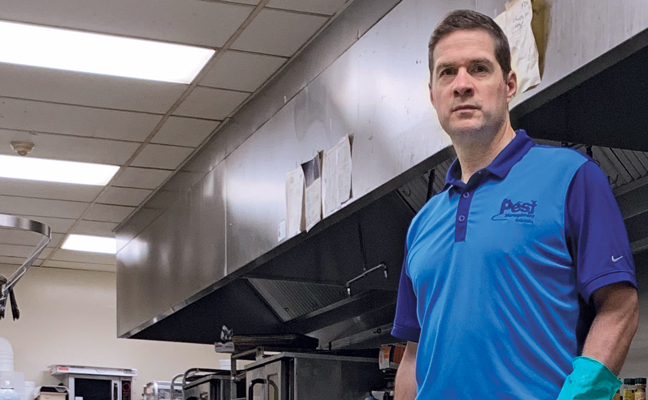
Photo: Landon Fleming
This month, we check in with David Fleming, owner of Pest Management Solutions, Spartanburg, S.C. Because technicians at the 25-year-old company service plenty of restaurant accounts, Fleming used parts from existing equipment to create a special compressed air sprayer system that makes the work easier.
1. Why design a special sprayer system?
Most companies use 1-gallon compressed air sprayers in commercial kitchens. But in my experience, we need to use more than 1 gallon of material at most commercial accounts. The problem is, a full 2-gallon sprayer is a tough haul if you’re treating commercial accounts all night long. It’s rough on your back and shoulders, very heavy during an eight-hour shift, and it can cause lots of long-term wear-and-tear on technicians. Also, it’s important to treat under kitchen equipment, and if you don’t get down on your hands and knees, you have to bend over to reach harborage areas. Plus, the 4-foot hoses on most sprayers don’t reach far enough.
2. How is it different from equipment currently available?
It is portable, has a longer hose, a wand with a curved tip, and it holds small tools and equipment. My compressed air sprayer system uses a 5-gallon bucket on a bucket dolly with wheels. The sprayer sits inside the bucket, and has an 8-foot hose that can be pulled around. The bucket has a caddy to hold small tools, small chemical bottles, insect monitors, and whatever else the technician needs. The final touch is an extendable wand with a flexible tip that can be curved to allow the technician to treat without bending or getting on hands and knees. The curved tip can be bent in any direction, causing a hook effect that can be easily adjusted by foot.
3. What is the most challenging aspect of restaurant work?
Any restaurant with lots of clutter, poor sanitation and management that doesn’t care is commonly considered a nightmare account. We don’t service nightmare accounts any longer because we will end up looking like we are not good pest management professionals when the client finally fires us, even though the issues are of their own making. The advantage of having foodservice customers, though, is working the night shift. That offers us flexibility in scheduling, working mostly indoors, and dealing with less traffic and fewer people.
4. Pest Management Solutions also offers minor repair and exclusion services. Why not subcontract that work?
Mainly, we do it for customer satisfaction. It lets customers know we are looking out for them beyond the monthly service visit. These services add to our bottom line. They help cut down on callbacks and enable technicians to earn commissions. If we have a callback, we then look for additional repairs that may add revenue.
5. In your experience, what’s the key to keeping customers satisfied?
Set customer expectations up front, before you perform the service. That way, customers are more likely to be reasonable if things don’t go as planned. In that event, we respond quickly and then follow up to let the customer know the issue was taken care of. Also, never say “We can’t do that” once they’re a customer. You will never have to say it if you set expectations up front. You should say “We can’t” before you’re hired. Don’t take jobs you’re not comfortable doing, and don’t be afraid to lose a job to a competitor that is better suited to the customer’s needs. Stay in your lane, and do what you do best. You’ll end up with tons of happy customers.
Read more: Sprayer system designed with techs in mind
Leave A Comment